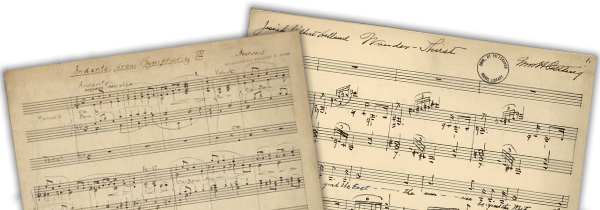
T. (Thomas) Carl Whitmer was an American organist and composer.
T. Carl Whitmer was an American organist and composer. He was born on June 25, 1873, in Altoona, Pennsylvania, where his father, A. C. Whitmer, was pastor of a German Reformed Church. Whitmer was educated at Franklin & Marshall College in Lancaster, Pennsylvania, an institution from which he received an honorary doctorate in 1944. At the college, Whitmer studied piano with Charles H. Jarvis, organ with Samuel Prowse Warren, and composition with William Wallace Gilchrist. Following his education, he held several positions as organist and music director at various churches, including Pine Street Presbyterian Church in Harrisburg, Pennsylvania (1898–1899) and the Sixth Presbyterian Church in Pittsburgh (1916–1932). With this position, Whitmer inherited a substandard music program, which included only a vocal quartet as a choir. He augmented the choir significantly, founded a boy choir, and began programming pieces by J. S. Bach, Handel, Mendelssohn, Dudley Buck, and others.
In 1896, Whitmer gave a recital of organ symphonies by Widor at the First New Jerusalem Church in Philadelphia, played completely from memory.1 Whitmer instilled this practice in his students, most notably James Philip Johnston of Holy Innocents Church, Mt. Lebanon, Pennsylvania and Westminster Church, Dayton, Ohio; and Arthur B. Jennings of the Sixth United Presbyterian Church, Pittsburgh.2 In his organ teaching, Whitmer chiefly emphasized improvisation (the continuity of the Guilmant-Widor school), service playing (influence of the Anglican), and memorization. In addition to his church positions, Whitmer also served on the faculties of a number of institutions, including as director of the School of Music at Stephens College, Columbia, Missouri (1899–1909), director of music at the Pennsylvania College for Women (now Chatham University) (1909–1916), and the Pittsburgh Musical Institute.
After retiring from his position at Sixth Presbyterian Church in 1932, Whitmer moved to Dramamount, his farm near Newburgh, New York, where he had been teaching composition in the summers. He produced his spiritual music dramas at an outdoor stage and natural amphitheater at Dramamount, hoping to create a festival for performance of these works.
A prolific composer, Whitmer composed in many genres, including songs, organ pieces, anthems, and chamber and orchestral works. Only a few of these works were published. In the summer of 1943 in Pittsburgh, a city-wide celebration in honor of T. Carl Whitmer on his seventieth birthday was held.3 He died of a stroke on May 30, 1959, at his home in Poughkeepsie, New York.
Harvey Gaul characterized Whitmer’s music as “modernist.” He writes in a forceful manner, not concerned with orthodox melodies, i.e., two-bar, four-bar cadences, employing impressive harmonic combinations. Among his choral anthems, the most significant is a motet, the 84th Psalm, a work for chorus, contralto, harp, fiddle, and organ, published by the Western Theological Seminary. More extended works include the Choral Rhapsody based on a series of texts by Walt Whitman, and the large-scale motet When God Laughed, based on a text from Job, elaborated and embroidered by the composer. Whitmer wrote much chamber music, ranging from fiddle pieces to combinations of English horn and string quartet, and works for flute, oboe, clarinet, and bassoon in interesting combinations. The pinnacle of Whitmer’s compositional output are his spiritual music dramas, in which he mixes the abstract, mystical, and theological into theosophical interpretations conveyed through spoken word with choral background. His principal publishers were Breitkopf & Härtel, Gray, Birchard, Summy, and Willis.
Whitmer is the author of several books, including The Art of Improvisation.4 Interestingly, there is no comprehensive biography of the composer, save a few short sketches in various dictionaries and journals. A projected two-volume autobiography in typescript, titled "Waterbrooks," compiled with the aid of Arthur B. Jennings in 1938, is available online in the ULS Digital Collections (Vol. 1) (Vol. 2). The Carnegie Library of Pittsburgh holds a Collection of Music Manuscripts by Whitmer.